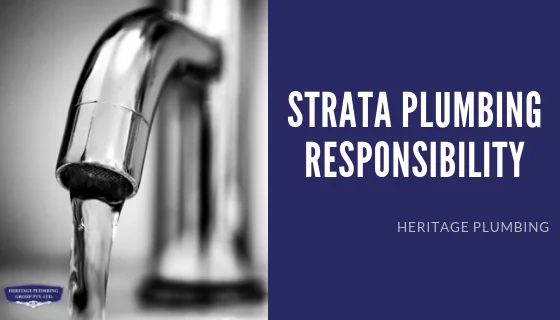Strata Plumbing: Who Is Responsible?
CATEGORIES
- News
- 02 - 08 - 2019
- By Heritage Plumbing

Strata Plumbing Responsibility
When you own a unit, townhouse or apartment, your property will be part of a strata scheme. Strata title applies to properties that shares common property with other properties on the same parcel of land. Each property is called a ‘lot’. When you share common property, the plumbing that runs through the common property is maintained and managed by the owners corporation. The owners corporation represents all the owners that own lots on the same parcel of land that has been subdivided into specific units, townhouses or apartments.
Many owners query strata plumbing responsibility when they face strata plumbing issues. Plumbing pipes run throughout a building and they will cross over into common and private property at various sections. When a plumbing issue occurs, such as a leaking pipe causing damage to private property and common property, a liability assessment is required. Usually the insurance companies of both the owners corporation and the private property owner suspected of the leak, will consider the strata title plans to determine who owns the portion of pipe that has been compromised. This is often a complex assessment that requires the engagement of specialised consultants, loss adjusters and legal counsel.
The parties try to resolve the plumbing issue fairly because the plans of the private properties and common property bound by the strata title, and the applicable legislation and regulations, are usually clear. If you are wondering about responsibility for common plumbing problems in strata properties, have a read of our responses to our frequently asked questions below. Remember these responses are a guide only and should not be considered as professional advice, especially legal advice. If you need further information in relation to your specific property or strata scheme, ensure you engage a qualified professional who is instructed about your circumstances.
What is strata plumbing exactly?
A plumbing system has many small and hidden parts. Strata plumbing refers to the network of pipes, fittings and fixtures that enable water to flow in and out of a property that is bound by strata title. Apartments, units and townhouses are often interconnected which means the underlying pipework is shared by many private lots and the overall in between and surrounding common property. Unlike what many people think, a group of units, apartments and townhouses rarely have separate plumbing lines unless this has been factored into construction of the build. The reason why separate plumbing lines aren’t favoured is because it can be expensive to install and result in too many pipes and fittings.
Who funds strata plumbing maintenance and management?
Ultimately, the owners proportionately fund the plumbing that services the common property and that runs through common property. Through the owners corporation fees that are collected by the owners corporation, the funds are used in part to pay for water services for common property amenities and to ensure the plumbing within common property boundaries are maintained and managed. The owners corporation is responsible for maintaining and managing plumbing that is part of common property.
For daily water bill expenses, this would be covered by the owners corporation’s administrative fund. However, for repairs to plumbing lines within common property and other common property plumbing services, funds will be taken out of the capital works or maintenance fund.
Who is responsible for upgrading strata plumbing?
Upgrading plumbing lines and fixtures presents a complex issue. When your apartment, unit or townhouse complex needs plumbing upgrades, often the owners will want the owners corporation to fund the upgrade. However, if there are not sufficient funds held by the owners corporation, the upgrades that affect private lots specifically will usually be borne by the respective owner. As an owner of a lot, it is important to consider the cost consequences before agreeing collectively to upgrades. Also, if you plan to perform upgrades to your private property’s plumbing, make sure you consult with the owners corporation because plumbing lines affecting both common property and other lots may be affected (and, you don’t want to be the one to blame for any damage caused by faulty work!).
Will the plan supporting the strata title always be correct?
When you acquire a property that is bound by strata title, it is important that you read and understand the plan to ensure you can locate the boundaries. The boundaries help you understand where liability falls. If you need further help understanding the plans, always engage a specialist so that you can make an informed decision. Liability in relation to a strata plumbing incident will be resolved by reference to the applicable plans, together with a review of relevant laws and regulations. For example, there is legislation on water which applies to leaks that occur in apartment and unit complexes (i.e. from one floor to another).
Liability for common scenarios
Liability for strata plumbing issues depends on the cause of the water leak or fault. This is often hard to locate, but with specialised tools, skills and experience, plumbers can successfully locate the fault and provide a comprehensive report that can be used as evidence in any negotiations and disputes. Here is a list of common plumbing issues, and an explanation of who will be liable.
- Leaking shower in private property: If the cause of the leak is from an internal fitting, then the owner will be responsible unless the cause of the leak can be traced to a plumbing issue caused by common property infrastructure.
- Leak from one property to another: This depends on how the leak has spread to your property. If the leak has been caused by a private lot owner’s internal fixture, the responsibility will fall with that private lot owner. However, if the leak is caused by the plumbing that is installed between the walls that services more than one property, this will be the owners corporation responsibility.
- Burst pipe under private property floor: A pipe that has burst under your property will usually be the responsibility of the owners corporation, unless the issue has been caused by a private lot owner (i.e. their toilet, kitchen sink, dishwasher, laundry trough, etc.).
- Water coming from balcony above: If the cause of the leak is because the owner above is using water that is falling on your property, the responsibility rests with the owner above you. However, if the cause of the leak is to do with the above owner’s balcony, this could either be the responsibility of the owners corporation or the owner above. Usually, it will rest with the owner.
- Damp and mouldy spots: Although many people think that dampness and mould is unlikely to occur, this is often a common and major issue. Dampness and mould are sometimes not related to a plumbing issue but instead the construction of the complex. A qualified builder will need to be engaged to assess the exact cause.
How to bring strata plumbing costs down?
There are many ways to bring strata plumbing costs down. It is important to ensure that strata plumbing is managed and maintained on a regular basis. While you will incur regular short-term costs, the overall long-term cost will be low and the plumbing infrastructure’s integrity will be strong. In addition, it is important to ensure that the apartment, unit or townhouse complex has a building manager that is responsible for overseeing strata plumbing. This will ensure garden taps, sprinkler systems, swimming pools, etc. are being checked and that private lot owners are not misusing or tampering with common property plumbing.
How can you prevent water damage in a strata scheme?
There are many steps you and the owners corporation can take to prevent water damage in a strata scheme. It is important that the plumbing infrastructure is inspected and maintained regularly. Often, owners and the owners corporation fail to invest in periodic inspections due to cost and inconvenience. This can exacerbate the problem because small issues are overlooked and these issues grow into larger problems. In addition to regular maintenance, the owners corporation rules should specify a code of conduct in relation to water usage, sewage disposal, private plumbing modifications and upgrades, hot water usage, and other plumbing-related matters. This will ensure owners, and the occupiers of the properties, use the plumbing infrastructure with care.
At Heritage Plumbing Group, we specialise in plumbing works for properties that are part of a strata scheme. Whether you have an enquiry about a plumbing issue related to your private property, or you are enquiring about a plumbing issue on behalf of the owners corporation you represent, our plumbers have the skills and experience to assist with all plumbing-related matters no matter the size and complexity. Strata plumbing issues can be complex, so it is best to ensure that once you have engaged a plumber that you consider where the responsibility lies too.
For fast, effective and comprehensive plumbing services, contact the team at Heritage Plumbing Group on (03) 9498 0458.
Experience Commercial Plumbers Melbourne – Heritage Plumbing Group
Related Posts – Strata Plumbing
How Much Does Plumbing Cost for a New House in Melbourne?
15 Things to Consider Before Hiring an Emergency Plumber
11 Signs You Need a Plumber in Melbourne
Water Leak Plumbing: Everything You Need to Know
10 Questions to Ask a Plumber Before Hiring
DIY Plumbing vs Hiring a Professional Plumber – Pros and Cons
What All You Need to Know When Hiring a Commercial Plumber in Australia
How Much Does Colorbond® Roofing Cost in Melbourne?
- RETURN TO BLOG
-
Understanding Whirlybirds: The Benefits of Whirlybirds Roof Vents
NEXT

 03 9498 0458
03 9498 0458 


















